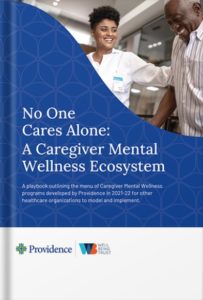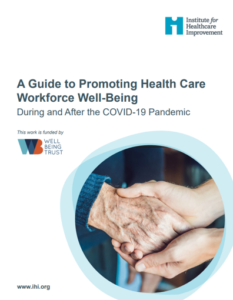
Supporting Providence’s 120,000-plus caregivers by promoting mental and spiritual health and wellness; expanding access
Before the COVID-19 pandemic, health care professionals were already at a heightened risk of burnout, mental health concerns, and suicide. As a result of the pandemic, we have only seen this trend accelerate.
Providence’s Well Being Trust is supporting a culture of wellness and resilience by partnering with other areas of the organization to create programs and resources that are adaptive to the needs of our caregivers by:
- Providing simple access via a “digital front door” to mental and spiritual health and wellness tools and resources, including clinical professionals (in-person or via telehealth).
- Engaging caregivers in a menu of spiritual and mental health and wellness activities.
- Normalizing help-seeking behaviors through ongoing education and de-stigmatization campaigns
- Proactively inviting caregivers to participate in a confidential and anonymous, online mental health check-up at least annually.
- Creating a Core Leader Outreach program, a proactive invitation for leaders to join a virtual consultation with our team of Wellness Consultants, made up of Chaplains and Behavioral Health Professional from across Providence.
- Providing suicide prevention training.
- Offering Tele-Spiritual Health virtual sessions.




